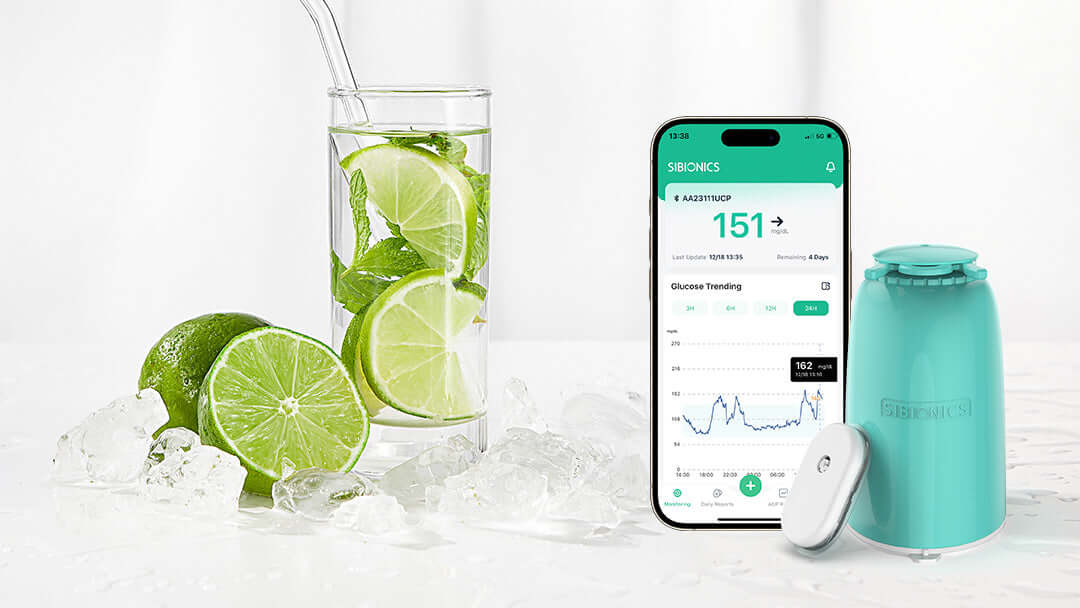In today's fast-paced world, it's not uncommon to indulge in sugary treats and snacks. Whether it's a tempting dessert after a meal or a quick energy boost during a busy day, sugar has become a ubiquitous part of our diets. However, there are times when we might find ourselves overindulging, leaving us feeling sluggish and bloated. In this blog post, we'll explore some practical tips on what to do after eating too much sugar to help you regain balance and promote overall well-being.
Sugar's Impact on Your Body:
Before delving into the solutions, let's understand what happens to your body when you consume an excess of sugar. When you eat too much sugar, your glucose spikes, causing a surge of insulin production. This can lead to a rapid energy boost, followed by a crash, leaving you feeling fatigued and irritable. Additionally, excessive sugar intake can contribute to inflammation, weight gain, and other health issues over time.
1. Stay Hydrated:
One of the first steps to take after consuming excess sugar is to hydrate your body. Sugary foods and drinks can contribute to dehydration, leaving you feeling tired and lethargic. Drinking water helps flush out the excess sugar from your system and promotes overall digestive health. Aim to drink at least eight glasses of water throughout the day to rehydrate and support your body in processing the sugar.
2. Choose Fiber-Rich Foods:
Fiber plays a crucial role in stabilizing glucose levels. After a sugary indulgence, opt for fiber-rich foods like fruits, vegetables, and whole grains. These foods not only provide essential nutrients but also slow down the absorption of sugar, preventing rapid spikes and crashes in glucose levels. Consider a colorful salad or a bowl of oatmeal with fresh fruits to help restore balance.
3. Incorporate Protein:
Balancing your sugar intake with protein can help stabilize glucose levels and keep you feeling full for longer. Include protein-rich foods such as lean meats, eggs, yogurt, or legumes in your post-sugar consumption meals. Protein helps regulate insulin production, reducing the likelihood of energy crashes and sugar cravings.
4. Move Your Body:
Engaging in physical activity is another effective way to mitigate the effects of excessive sugar consumption. Exercise helps your body utilize glucose for energy and can assist in lowering glucose levels. A brisk walk, a light jog, or a workout session can all contribute to improved metabolism and increased energy. Exercise not only helps your body process sugar more efficiently but also releases feel-good endorphins, improving your mood and energy levels.
5. Continuous Glucose Monitoring:
Enhance your post-sugar recovery with the SIBIONICS GS1 Continuous Glucose Monitoring (CGM) System. This cutting-edge device offers 24/7 real-time glucose monitoring for 14 days, eliminating the need for scanning or finger-pricking. With a calibration-free and waterproof design, the SIBIONICS GS1 CGM seamlessly integrates into your routine, providing valuable insights into your body's response to foods and activities. Take control of your health by making informed decisions with SIBIONICS CGM and user-friendly SIBIONICS app.
6. Probiotics for Gut Health:
Excessive sugar intake can negatively impact your gut health, leading to an imbalance of beneficial and harmful bacteria. Probiotics, found in fermented foods like yogurt, kefir, and sauerkraut, can help restore a healthy balance in your gut microbiome. Consider adding these probiotic-rich foods to your diet to support digestion and overall well-being.
7. Prioritize Sleep:
Adequate sleep is essential for overall health, including maintaining a balanced glucose level. After a sugary episode, ensure you prioritize getting a good night's sleep. Sleep allows your body to recover and regulates hormones that impact hunger and satiety. Aim for 7-9 hours of quality sleep to support your body in returning to its natural state of balance.
8. Consider Herbal Teas:
Certain herbal teas, such as peppermint, chamomile, or ginger tea, can aid in digestion and provide a calming effect. These teas are caffeine-free and can be a soothing addition to your post-sugar routine. Enjoying a cup of herbal tea may help alleviate bloating and discomfort while promoting relaxation.
Conclusion:
Indulging in sugary treats occasionally is a part of life, but it's essential to know how to navigate the aftermath. By prioritizing hydration, choosing nutrient-dense foods, incorporating physical activity, continuous glucose monitoring and ensuring adequate sleep, you can effectively recover from a sugar overload. Implementing these strategies will not only help you feel better in the short term but also contribute to your long-term health and well-being. Remember, balance is key in maintaining a healthy lifestyle.
FAQs:
Q: Can you get diabetes from eating too much sugar?
A: While excessive sugar consumption is linked to an increased risk of developing type 2 diabetes, it is not the sole cause. Genetics, lifestyle factors, and obesity also play significant roles in diabetes development. Consistently consuming high amounts of sugar can contribute to insulin resistance, a key factor in type 2 diabetes.
Q: How can I flush sugar out of my system fast?
A: You can help regulate glucose levels by staying hydrated, engaging in regular physical activity, and consuming a balanced diet rich in fiber, lean proteins, and healthy fats. Avoiding sugary foods and beverages can also prevent further spikes in glucose.
Q: How much sugar is OK in a day?
A: The recommended daily intake of added sugars varies, but many health organizations suggest limiting added sugar intake to less than 10% of your total daily calories. For example, the American Heart Association recommends that women limit their added sugar intake to 6 teaspoons (25 grams) per day and men to 9 teaspoons (38 grams) per day.
Q: Does peeing flush out sugar?
A: Yes, to some extent. When you have excess sugar in your bloodstream, your body tries to eliminate it through urine. However, relying on urination alone is not an effective or sustainable method for managing glucose levels. Adopting a balanced diet, staying hydrated, and engaging in regular physical activity are more reliable ways to maintain healthy glucose levels.
Q: What organ is sugar bad for?
A: Excessive sugar consumption can negatively affect various organs, but the liver is particularly impacted. When you consume too much sugar, the liver converts it into fat. Over time, this can lead to fatty liver disease and insulin resistance, contributing to the development of metabolic disorders such as type 2 diabetes. Additionally, high sugar intake is associated with an increased risk of heart disease and other health issues.
SIBIONICS GS1 CGM – system ciągłego monitorowania poziomu glukozy

677.00 dh
14-dniowe ciągłe monitorowanie poziomu glukozy Bardzo dokładne odczyty czujnika Eksportowalne raporty AGP Udostępniane w czasie rzeczywistym dane dotyczące poziomu glukozy Konfigurowalny alarm poziomu glukozy Przyjazna dla użytkownika aplikacja Bez kalibracji Brak skanowania Wodoodporność IP28 … read more









